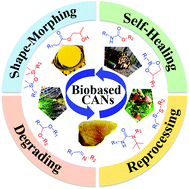Biobased covalent adaptable networks: towards better sustainability of thermosets
Abstract
Thermosets have many advantages such as excellent mechanical properties, dimensional stability, and chemical and environmental resistance, but suffer from unsustainability because they cannot be reprocessed, are difficult to recycle, and are overdependent on petroleum chemicals. Biobased covalent adaptable networks (CANs) represent a new type of crosslinking polymer derived from biomass-derived feedstocks and crosslinked by dynamic covalent bonds (DCBs). Biobased CANs provide an alternative solution to the sustainable development of traditional thermosetting polymers because they are not only not dependent on petroleum chemicals, but are also reprocessable and recyclable through the exchange reaction of DCBs under suitable conditions. Moreover, biobased CANs exhibit some other attractive functionalities such as self-healing, weldability, configurability, shape memory, and intelligent response. In such contexts, much effort has been devoted to designing and synthesizing biobased CANs from various biomass-derived chemicals such as vegetable oils, lignin and its derivatives, natural rubber, and sugars by incorporating various existing or designed DCBs, and notable progress has been achieved in this field. In this review, we summarize the recent progress on the design and synthesis of biobased CANs and suggest opportunities and challenges for their future development.

- This article is part of the themed collection: Green Chemistry Reviews


 Please wait while we load your content...
Please wait while we load your content...